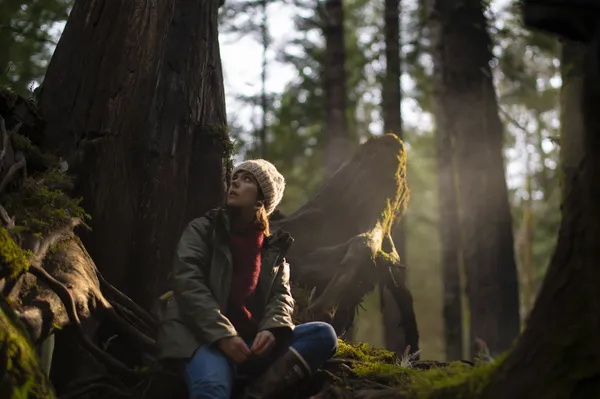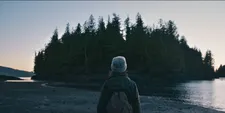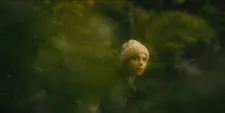 |
| A magical location in The Island Between Tides |
In the first part of my interview with Andrew Holmes and Austin Andrews on their latest film, The Island Between Tides, we discussed their fascination with time and their work with stars Paloma Kwiatkowski, Donal Logue and David Mazouz. In part two, we discuss their locations, aspects of storytelling, their feelings about screening at Fantaspoa and the way they captured the magic of the time-shifting island at the centre of their ghostly tale.
“The island was truly a magical place,” says Andrew. “We shot the film in Prince Rupert, British Colombia, which is the north-westmost point in Canada. Basically, it's just south of Ketchikan, Alaska, and it is a magical place. And that was probably the most difficult decision that I had to make going into this film was where to film this location. We really shot at the most perfect island, and it was probably the single reason why we decided to put ourselves through the difficulty of shooting in a remote city in British Columbia that's got literally no film infrastructure whatsoever. You want to get specific batteries for something, they're coming from Vancouver. But the cool thing about Prince Rupert is Canada's not a very old country. Cities are lucky to be 100 years old, and Prince Rupert looks like a hundred-year-old city.
“A lot of the buildings, the building that Jared lives in, the city was going to tear that down months before we were filming there, and they decided to leave it standing so we could film in it and in front of it. And there was so much value in shooting in Prince Rupert, but it was finding that island so that we didn't have to cheat.
“The island's not very big, so we ended up shooting some of the interior island, as we call it, in some parks outside of Prince Rupert and bringing in some of that fantasy and that fairy tale of Neverland and always feeling warm enough. You know, this is a cold, rainy place, and it should always feel that Lily is at home, and she's never hungry, she's never cold. She's always comfortable on the island. It's always feeling inviting. And that was the real big focus in filming the island that way. It was very special to us.”
 |
| Paloma Kwiatkowski in The Island Between Tides |
“Yeah,” says Austin. “And to build on what Andy was saying, too, about Prince Rupert and how perfect it was, there was a period of time when Prince Rupert was the same size as Vancouver. It was primed to be the next big city on the west coast of Canada. It's a terminus for railway. It's gone the largest deep water port on the west coast of North America. And there's been so little new construction for a century. It's conceivable that the boardwalk fight that happened, say, 70 years ago, could have happened on that same boardwalk because it hasn't been dismantled. You go to a city where history is more ephemeral and it doesn't feel as rooted in everywhere you walk around. We’d lose that.
“We can't have this house have been renovated. The whole city has to feel like it did a century ago, and that was the only place we could find that. Canada, as Andy says, is such a new country, and history gets dismantled so quickly.”
Alongside thar, they're telling the story of places changing in little ways over time. So how did they get the right balance so that they weren't making it too obvious immediately that we've moved into a different time?
“I think it's more that the people change and the places don't, by and large,” he says. “I mean, there are some exceptions, but really, looking at how a place defines and sets us up as people, I think is an interesting one, too. What our geography does to shape character, I guess, and shape our relationships, especially living in a far flung location. What does that do to close their horizons or open others? And, of course, the biggest thing being this island and what a secret it is, we knew that we could only set this story there.
“Of course, JM Barrie set the original in the Hebrides, in Scotland. We had to find an equivalent on the west coast of North America, and short of setting it in Alaska, which is not a world we know, you know, we know coastal British Columbia. And when we found this island, we were saying to ourselves that it is so remote – an hour by boat from an already very small community – it could be conceivable that there have only been a small number of people who have stepped foot on this island before, which is essential because that's what the island in the story is. There have only been five people who set foot on it, who can all be seen by each other.”
“We were so worried about the subtlety of the clues, says Andrew. “Whether Lily would recognise it, because of the architecture and because small towns stay the same like this. That was a big reason behind the umbrella rotting beside the island when she comes off. We see some of the cars, but if you're not a car person, you're not going to recognise that's a 2020 car instead of a 1990s car. Maybe you don't clock the fact that the family is taking a selfie.
“Then you get back to the house and, yeah, we pressure washed and painted the house in between those periods so it looked fresher, planted some new flowers. It looks a lot newer when she comes back. But these are all so subtle that were concerned that people weren't going to clock the fact that she's gone in time until, you know, a newspaper headline said ‘2024’. Hopefully it was subtle in a way...”
“...that wasn't spoon fed,” adds Austin.
Andrew nods. “But I think everyone picks up a different thing as she comes back to current time.”
We talk about the writing process behind all this.
“I think it's the excitement of a new project that's got so much promise,” Andrew says, reflecting on how much he enjoyed it. “You start to see the vision and it comes alive in your head. You know, the production is difficult and Prince Rupert is lovely, but I could go for a little while without being back there because it just brings up the difficulties of production. But having a project that we really believed in and writing stuff that we thought, ‘Hey, this is going to be something that audiences are really going to like.’”
 |
| Paloma Kwiatkowski in The Island Between Tides |
“As Andy's saying this, I'm flung back into what it was like actually shooting it,” says Austin. “We were able to bring in a really good group of on-the-ground producers, but ultimately, Andy and I were also producing this ourselves. So we would have a 12-hour block where we got to play and work with the actors and the other key creatives. And I say ‘play’ – there's a lot of very difficult stuff. We were shooting during the height of Covid two years ago as well. There were all these things that would come up on a day by day basis.
“After those 12 hours were up, Andy would then go to the production office and have to deal with the day's fires, with money having fallen through or actors who weren't able to get up for the next day because flights were canceled, or moving the schedule around or whatever it was. That was more of the burden that he would shoulder. And it was just to the point where we felt we got away with a heist, almost, being able to get this movie in the can and finish, because at so many points it looked like it was going to fall apart. And amidst all of this, we still had to keep the strength, uniformity and enthusiasm in the vision.
“That was, I think, the sanctuary. Being able to work with the actors, being able to work with our DP, Danny Lavoie, and actually see these images come together. Adapting this play had been a dream for so long, and to see it come to life somehow tempered the curveballs that were coming in from every direction.”
“Every production's got its challenges,” says Andrew. “We don't want to make it seem like, ‘Oh, our movie was tough,’ but, you know, it was probably the most difficult thing that Austin and I have ever done and accomplished. We're so proud of the film because of that, but it really was difficult. And if there's any kind of regrets in the production, it’s the fact that we didn't get to enjoy the playtime, as Austin said, as much because we had so much to do in such a short time. We filmed over 22 shooting days in Prince Rupert, and we did have a pick-up day or two.
“A friend, Rupert Evans, said that it's the difficult ones that you get to be proud of. If it was really easy, you're probably not going to really get a product that people are going to like. And that was really reassuring, because as we got to the edit process, you can see on the screen the stuff that was so difficult to execute and to pull off. For us, a large part of that was getting a film crew to an island that was one hour away, that may be two hours away if the seas aren't friendly that day – or, you know, trying to make an island look inviting in the rainiest city in North America. But the sun came out on the day that we had to film on the island, for the only day in production.
“So when you're through editorial and you're looking at the film and you think ‘Oh, I remember that day. I was miserable that day because of all of the curveballs’ – at the end of the process you get to look at it. Talking to some of the audience members that love the things that we worked so hard towards and a few of the real subtle moments that we purposely did, the payoff is there as well.”
Andrew’s focus was all on the creative work, he tells me, and he didn’t know much about the promotional side.
“I didn't know Fantaspoa existed. Austin's much more in tune with the genre circuit. He was very excited when we were invited to screen there. It was such a cool experience. We didn't get to stay for very long, just out of schedules and work, but I can't wait to bring another movie back there. It's pretty crazy. They have about four key people that run the whole festival. The audiences are so dedicated and cool. We saw an incredibly awesome, weird film from Japan that I never would have seen otherwise.”
I ask what this was and Austin says “It was Visitors. A total splatter fest.”
“It was something that I never would have watched otherwise,” Andrew reflects. “I think Austin and I didn't stop laughing for most of the film, at the stuff that was intended to be laughter. And our other producers, again, aren't used to watching that kind of stuff, and so we got to look over at them – and, like, this is what we're here for. We're here to see other people in this curated program. That was just so awesome. I think we've been really fortunate with the festivals that we've played thus far, with Fantaspoa, and Panic Fest in Kansas City was also incredible. And you really get to see the community that's behind genre films.
 |
| Paloma Kwiatkowski in The Island Between Tides |
“Of course, we opened Cinequest in San Jose. They've done such a great thing with that festival and really made us feel special with the event. And it was very cool to see about a thousand people packed into a theatre that's over 100 years old, just this very historic place playing our movie that was inspired around the same era. So that process has been really fun.”
“We know that our next step is going to be a pivotal one,” says Austin. “Our previous movie [Lord Jones Is Dead] was a media satire set in South Africa that was done on a shoestring budget. And to go from that to The Island Between Tides, not even talking about in terms of budget or resources or anything, but in terms of what one says as a statement about the other, you know, I think we're in it for the adventure of making the films as well.
“Andy and I have talked about wanting to do a film on every continent during our careers. I think one of those continents is going to be more difficult than the others. But, you know, we're working out what that next step is going to be. It certainly won't be a ghost story. We've got a few projects that we've been developing. Now we have to go full tilt on choosing probably two horses and really running with them. I think you'll see a lot of similarities in some of the material, themes, ideas, just explored from very different angles, likely in different genres.”
“I have a documentary project, a film that's coming out later this year that we're just putting the finishing touches on,” says Andrew. “It’s a biography of action icon Dolph Lundgren, and hopefully that plays festivals this fall as well.”





















